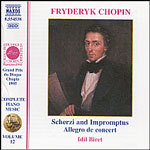
Chopin: Complete Piano Music Vol 12: Scherzi / Impromptus / Allegro de Concert
 $25.00
Out of Stock
$25.00
Out of Stock6+ weeks add to cart
FREDERIC CHOPIN
Chopin: Complete Piano Music Vol 12: Scherzi / Impromptus / Allegro de Concert
Idil Biret, piano
[ Naxos / CD ]
Release Date: Friday 25 February 2005
This item is currently out of stock. It may take 6 or more weeks to obtain from when you place your order as this is a specialist product.
Fryderyk Chopin was born in 1810 at Zelazowa Wola, near Warsaw. His father Nicolas Chopin was French by birth but had moved to Poland to work as an accounting clerk, later serving as tutor to the Laczynski family and thereafter to the family of Count Skarbek, one of whose poorer relatives he married. His subsequent career led him to the Warsaw Lyceum as a respected teacher of French, and it was there that his only son, Fryderyk, godson of Count Skarbek, whose Christian name he took, passed his childhood.
Chopin showed an early talent for music. He learned the piano from his mother and later with the eccentric Adalbert Zywny, a violinist of Bohemian origin, and as fiercely Polish as Chopin's father. His later training in music was with Jozef Elsner, director of the Warsaw Conservatory, at first as a private pupil and then as a student of that institution.
In the 1820s Chopin had already begun to win for himself a considerable local reputation, but Warsaw offered relatively limited opportunities. In 1830 he set out for Vienna, a city where he had aroused interest on a visit in the previous year and where he now hoped to make a more lasting impression. The time, however, was ill-suited to his purpose. Vienna was not short of pianists, and Thalberg, in particular, had out-played the rest of the field. During the months he spent there Chopin attracted little attention, and resolved to move to Paris.
The greater part of Chopin's professional career was to be spent in France, and particularly in Paris, where he established himself as a fashionable teacher and as a performer in the houses of the rich. His playing in the concert hall was of a style less likely to please than that of the more flamboyant Liszt or than the technical virtuosity of Kalkbrenner. It was in the more refined ambience of the fashionable salon that his genius as a composer and as a performer, with its intimacy, elegance and delicacy of nuance, found its place.
In 1848 political disturbances in Paris made teaching impossible, and Chopin left the city for a tour of England and Scotland. By this time his health had deteriorated considerably. At the end of the year he returned to Paris, now too weak to play or to teach and dependent on the generosity of others for subsistence. He died there on 17th October, 1849.
The greater part of Chopin's music was written for his own instrument, the piano. At first it seemed that works for piano and orchestra would be a necessary part of his stock-in-trade, but the position he found for himself in Paris enabled him to write principally for the piano alone, in a characteristic idiom that derives some inspiration from contemporary Italian opera, much from the music of Poland, and still more from his own adventurous approach to harmony and his own sheer technical ability as a player. The Impromptu, in title at least, was typical of its period in its suggestion of romantic abandon and freedom. In common with much else in European music, it had its origins in Prague with the publication in 1822 of Impromptus by Jan Vaclav Vori∫ek, followed five years later by the Bohemian-born composer Marschner. Schubert's publisher in the 1820s, Tobias Haslinger, found the title commercially attractive, and thereafter the name endured, descriptive of an independent piano piece, lacking the formality of a sonata movement.
Tracks:
Scherzo No. 1 in B minor, Op. 20
Scherzo No. 2 in B flat minor, Op. 31
Scherzo No. 3 in C sharp minor, Op. 39
Scherzo No. 4 in E major, Op. 54
Impromptu No. 1 in A flat major, Op. 29
Impromptu No. 2 in F sharp major, Op. 36
Impromptu No. 3 in G flat major, Op. 51
Fantaisie-Impromptu No. 4 in C sharp minor, Op. 66
Allegro de concert, Op. 46


